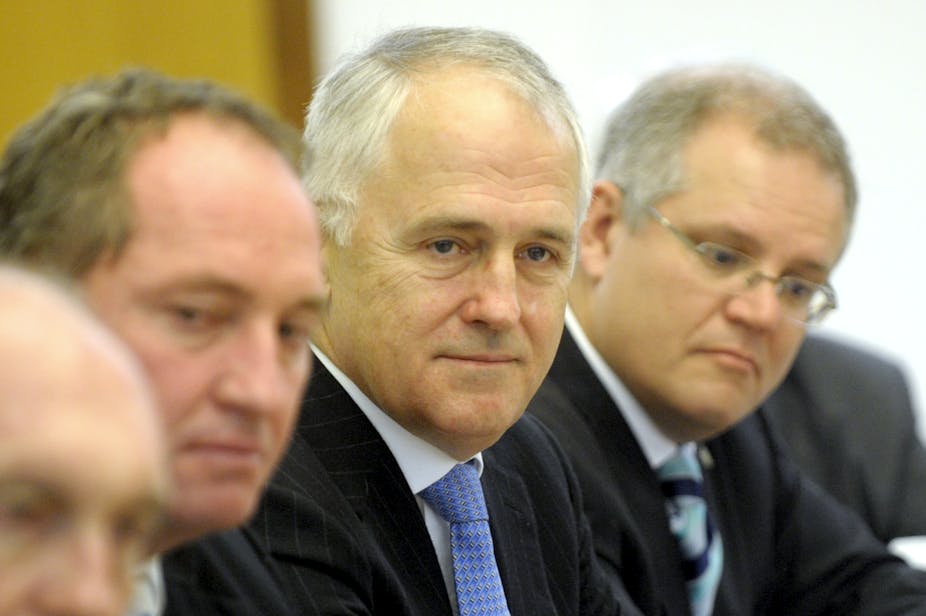With Tony Abbott lagging as preferred PM against Kevin Rudd, Liberal frontbencher Malcolm Turnbull has cast the election as a contest between a presidential pitch and “a traditional cabinet-based, consultative team approach to government”.
In a speech titled “Leadership in times of Uncertainty”, Turnbull said: “We do not see this election as a presidential contrast, a contest between Kevin Rudd and Tony Abbott. We are a team and we will be contrasting our team with Mr Rudd’s”.
In last week’s Newspoll, Rudd led Abbot 49-35% as better PM.
Rudd would run a presidential campaign. He could not focus on the team because of their divisions and dissensions.
In his Sir John Monash Oration late last week, Turnbull delivered what can be taken as some implicit messages for Tony Abbott if he becomes prime minister.
Turnbull said business leaders often complained about politicians being too populist and shying away from unpopular decisions. But a political leader had to chart a course between making the right decisions for the nation’s future and securing the consent of the governed – and that meant the governed’s representatives in cabinet and indeed his party room.
He warned against political leaders who didn’t do much. “I can’t imagine anything worse than being elected again and again to a leadership position and not doing anything with it.
"But equally the political leader whose courageous reform agenda is so compelling that he is unable to win or hold office for long enough to implement it will be equally impotent as the political do-nothing.
"So popularity is critical for a politician. This is where political leadership is very different to business leadership”.
Turnbull contrasted Rudd’s fall as leader with his own. Rudd had failed to manage a whole lot of personal relationships. “My own downfall as leader of the Liberal party was somewhat different because it was based on a big issue of policy”.
The pressures on political leaders were more intense than ever before, with the continuous news cycle.
The temptation to go for the “grand gesture, the big headline, the instant response, the quick fix has never been stronger”.
The pressures encouraged leaders to become “dynamic doers, who make decisions, who don’t waste time in committees, who don’t have shiny-bottomed bureaucrats telling them what to do, who have visions, who nation build, who see the future and grasp it with both hands.
"They often have minders and advisers who encourage them into this presidential approach”, he said.
“Leaders are very often susceptible therefore to the allure of being the Great Commander”.
Turnbull said many of the failings of the first Rudd government were as a result of the failure of the cabinet to work effectively. Too many decisions were take by the PM himself or the “gang of four”.
Leaders should consult “not simply to maintain the consensus on which their leadership depends but to improve the quality of the decision-making.”
The obligation was not simply on the prime minister. “In a properly- functioning cabinet system, initiatives will come from ministers all the time. They should be prepared to argue their case in cabinet, rather than simply securing the support of the prime minister”.
Cabinet ministers also owed a “most solemn obligation to be candid with each other” – which raised the question of why Rudd’s ministers had not confronted him with his failings and insisted he change his ways, Turnbull said.
He dwelt on the strengths of John Howard who “ran a traditional cabinet system”, and was “genuinely consultative”.
“If we are returned to government later this year. We are determined to re-establish traditional cabinet government in Canberra”, Turnbull said. “We’ve seen how cabinet government can work well, and in the last six years what happens when prime ministers try to run the country from their office”.
Turnbull said there was always the tendency to tell the leader what he wants to hear, but an effective leader would always discourage the sycophants and encourage the critical alternative views.
He gave a pointed example in an anecdote from his time as leader about one of his colleagues, Kevin Andrews (who later launched a leadership challenge against him).
He said that he and a number of others had thought the second Rudd stimulus was not only bad policy but a line in the sand for the Liberals on the grounds of their economic responsibility credentials.
“We had a very vigorous debate in the shadow cabinet and a very vigorous debate in the party room, and one of the most useful contributions in that party room was by Kevin Andrews, who is a former barrister, who gave a really compelling cogent case for supporting the stimulus, but because he laid out the case for it so well and so clearly, you could see the flaws in the argument.
"Your decision, the course of action you favour as a leader or as a minister, is only going to be strengthened by people making the argument against it, unless of course it’s a bad idea, in which case it might be exposed for what it is.”

